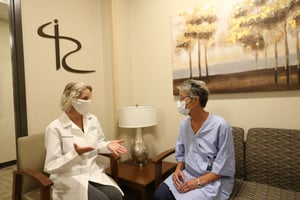 Magnetic Resonance Imaging (MRI) can be used in addition to mammography to produce detailed images of the breast. Breast MRI is commonly used after a biopsy that indicates the presence of breast cancer, but it may also be used as a screening tool in certain individuals.[1]
Magnetic Resonance Imaging (MRI) can be used in addition to mammography to produce detailed images of the breast. Breast MRI is commonly used after a biopsy that indicates the presence of breast cancer, but it may also be used as a screening tool in certain individuals.[1]
Women at High Risk for Breast Cancer
The American Cancer Society recommends that women with particular risk factors be evaluated using breast MRI. The procedure is indicated for
- Women whose lifetime risk of developing breast cancer is estimated to be 20-25% or higher;
- Women with mutation of the BRCA1 or BRCA2 genes, which indicate an elevated risk of breast and/or ovarian cancer;
- Women who have not been evaluated for BRCA1 or BRCA2 gene mutations but have a first-degree relative (mother, sister, or daughter) with one of these mutations;
- Women who have had radiation treatment to the chest between the ages of 10 and 30’
- Women with genetic disorders that increase cancer risk, including Li-Fraumeni syndrome, Cowden syndrome, or Bannayan-Riley-Ruvalcaba syndrome; and
- Women with first degree relatives who have been diagnosed with one of these disorders[2]
At Iowa Radiology, we evaluate our patients’ breast cancer risk using the Tyrer-Cuzick model, which takes into account a woman’s age, BMI, family history, hormone replacement therapy (HRT) use, and ages at which they experienced their first and last menstrual cycles and first childbirth. We report any result showing at least a 20% lifetime risk of breast cancer to the patient’s health care provider.
Women with family history of breast cancer may be referred for genetic counseling and possible testing for mutation of the BCRA1 or BCRA2 genes.
Patients Diagnosed with Breast Cancer
When a patient receives a positive breast biopsy result, MRI is often used to determine the extent of the cancer. MRI can be helpful in determining the course of treatment, for example, in comparing the relative expected benefit of lumpectomy as opposed to mastectomy.[3] The procedure is also useful in examining other parts of the breast, particularly when cancer is found to have spread, and also in examining the opposite breast for early signs of abnormalities. Women with cancer in one breast have approximately a 10% chance of developing cancer in the other breast as well.[4]
Patients who undergo neoadjuvant chemotherapy before surgical removal of breast cancer may also benefit from monitoring via breast MRI to determine the effectiveness of the treatment and size of tumor prior to surgery.[5]
Other Potential Breast MRI Candidates
For some patients, mammography alone may not be sufficient for effective breast cancer screening. MRI is one alternative that can provide patients and their health care providers with information that a mammogram may be unable to detect. Physicians may recommend breast MRI:
- For patients with history of precancerous breast change.
- To track any changes in lumpectomy scars;[6]
- To detect leaks or tears in breast implants;[7] or
- To detect small abnormalities in lymph nodes that would be undetectable through mammography or ultrasound alone. [8]
Iowa Radiology has earned breast MRI accreditation and is an American College of Radiology Breast Imaging Center of Excellence. This designation recognizes our attainment of high levels of safety, professional training, and quality imaging. We pride ourselves on delivering exceptional customer service, and we always take the time to fully explain procedures before they are performed. If you ever have questions about a procedure scheduled or performed at one of our clinics in Des Moines, Ankeny, Clive, or Lakeview, feel free to contact us, and we will be happy to talk with you.
The information contained in the Iowa Radiology website is presented as public service information only. It is not intended to be nor is it a substitute for professional medical advice. You should always seek the advice of your physician or other qualified healthcare provider if you think you may have a medical problem before starting any new treatment, or if you have any questions regarding your medical condition.
Iowa Radiology occasionally supplies links to other web sites as a service to its readers and is not in any way responsible for information provided by other organizations.
[1] http://www.mayoclinic.org/tests-procedures/breast-mri/basics/definition/prc-20020473
[2] http://www.hopkinsmedicine.org/healthlibrary/test_procedures/gynecology/breast_magnetic_resonance_imaging_mri_92,P09110/
[3] http://www.hopkinsmedicine.org/healthlibrary/test_procedures/gynecology/breast_magnetic_resonance_imaging_mri_92,P09110/
[4] http://www.mayoclinic.org/tests-procedures/breast-mri/basics/definition/prc-20020473
[5] http://www.radiologyinfo.org/en/info.cfm?pg=breastmr - part_two
[6] http://www.mayoclinic.org/tests-procedures/breast-mri/basics/definition/prc-20020473
[7] http://www.cancer.net/navigating-cancer-care/diagnosing-cancer/tests-and-procedures/breast-mri
[8] http://www.hopkinsmedicine.org/healthlibrary/test_procedures/gynecology/breast_magnetic_resonance_imaging_mri_92,P09110/


